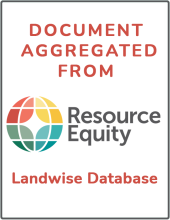Land Library
Bienvenido a la biblioteca de Land Portal. Explora nuestra amplia colección de recursos de acceso abierto (más de 74.000), que incluye informes, artículos de revistas científicas, trabajos de investigación, publicaciones revisadas por pares, documentos jurídicos, vídeos y mucho más.
/ library resources
Showing items 1 through 9 of 121.In the paper short data on the results of implementation of pilot land consolidation projects in 6 villages of the Republic of Moldova in 2007-2009 are presented. As a result it became possible to accumulate the experience necessary for extension of these works in scales of all country.
This article estimates the poverty reducing impact of the recent land reforms and land transfers in the different land tenure systems of Uganda.
The caste system is an intricate part of the institutional structure as well as class formation, political instability and conflicts in Nepal. The most severely discriminated group in the caste system is the Dalits, the so-called “untouchables”.
The question of land and agrarian reform has become the most pertinent post-conflict agenda at this historical juncture while the country is undergoing a restructuring process. State restructuring is about the restructuring of the economic and political power.
Land, and its proper management, is a central issue in developing countries. Efficient use and management of land are key contributors to maximizing the potential benefits of sustainable socioeconomic development.
In this chapter, I adapt the game approach to examine the differences and conformities between formal legal laws and under-law regulations of the party-state institutions and the real practices of the Red river delta villagers on the holding and use of agricultural land.
This paper aims to describe the status of land reform in Cambodia by looking at the background information, general approaches and basic types of land reform from the world’s views and experience, and the efforts taken thus far on land reform in Cambodia.
ABSTRACTED FROM SUMMARY: One of the peculiarities of the Vietnamese land system is the existence of a ‘zero state’ with regard to land institutions: all the country’s existing land institutions were put in place in the last 25 to 30 years.





